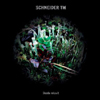Schneider TM, "Škoda Mluvit"
 Schneider TM attempts to broaden the palate with the help of Max Turner and grandmother Edith Kuss. Thankfully he doesn't abandon the machine-like vocal tendencies that can be so endearing. Not everything works on Škoda Mluvit, but there are moments of bliss and fun.
Schneider TM attempts to broaden the palate with the help of Max Turner and grandmother Edith Kuss. Thankfully he doesn't abandon the machine-like vocal tendencies that can be so endearing. Not everything works on Škoda Mluvit, but there are moments of bliss and fun.
Confident and obtuse vocals delivered by German speakers, or indeed by robots, can be very satisfying and this new record obliges, up to a point. Schneider TM, a.k.a. Dirk Dresselhaus, had his first huge breakthrough with "The Light 3000," which used voice synthesizers to cover The Smiths' "There Is a Light and It Never Goes Out," and in the process created an expression of emotional knowledge and alienation that was a valuable contribution to the, shall we say, Do Androids Dream of Electric Sheep?, debate. It was that rare thing, a cover version that didn't merely attempt to bask in reflected glory or end up just being the unromantic sound of familiarity. "3000" now seems to predict recordings from Mr_Hopkinson's Computer, while echoing elements of Langley Schools Music Project, Eedie & Eddie (two DecTalk‚Ñ¢ voice synthesizers), and Nico (because at her best she sounds like a robot), by using a combination of conviction and innocence to transform familiar material. Most people will have heard the cool digipath CAL from 2001, the voice slowly shifting from a portrayal of emotionless, yet genial assurance, to deranged existential panic. If someone had thought to capture the lonely libidinous ache of the drones from the film Silent Running maybe it would better capture the playfulness of Schneider TM.
There are no covers on Škoda Mluvit, and the record moves further into the use of traditional or real instruments than previous ones. The pace of some of these tracks, along with the always potent and sometimes mechanical vocals, lend urgency to pieces which otherwise have a pretty relaxed feel. Opener "More Time" consists of a chugging electronic beat and synth waves complimenting a few repetitious words. By contrast, "Pac Man/Shopping Cart" features sweet guitar phrases, a click and stutter rhythm and lilting singing to suggest some emotion. As with Tarwater, the voice is so effortlessly commanding that the instructions off a bottle of tablets could be the lyric and it wouldn't matter. It's just as well, since that is exactly the idea for "Caplets." This track plinks and strums along to around the three minute mark with said medicinal advice, before coming back with the voice more synthesized and complimented by the cello of Hildur Gudnadottir. The recurring phrase "8 days a week" may bring unavoidable associations for certain listeners.
"Voudou" has a more funky sensibility that neither gels nor is so artificial that it becomes attractive. The title track has vocals from Edith Kuss and hip hop artist Max Turner. I'm not about to say anything bad about anyone's grandmother but I prefer "The Blacksmith" also featuring Turner. It is more swinging and benefits, as would virtually anything, from quoting Curtis Mayfield and mentioning Leadbelly. Sometimes, even the worst lyrics can sound good: "Time flies by, like a fly" from "Cateractact" works, again due to Schneider TM's confident delivery, here allied to a wind-up, catapulting sense of percussion. Strangely the least convincing moments on Škoda Mluvit come when the words 'fucking' and 'motherfucker' are used.
An argument once ensued in our house as to the meaning of Barbie TM. One party felt that this was her initials (Tina Marie) whereas another was sure that it referred to her status as a Tall Model. This was not a particularly challenging nor totally rewarding listen, but rather there are some choice tracks that stand out, almost a trademark of the endearingly flawed Schneider TM sound. Most disappointing of all is "The World's A Cup" which appears to sneer in vague complaint at the 2006 World Cup tournament, held in Germany. The contrast with The Colonel’s fabulous "Cup My Balls" (on V/VM) is stark. The Colonel's leering and romping with overtones of empiric conquest and thuggish pillage was a jaw-dropping masterpiece of innuendo and Bond uber-riffing; as if John Barry were holed-up in the Playboy mansion watching games between, well, you know... Schneider TM's is the opposite and just seems a bit of miserable moan. Thankfully, just before that, "The Slide" harks back to some of the more affecting moments of the Factory Records catalogue. The understated track is seemingly throwaway, appears aimless, and yet comes across as profound. A trick that Schneider TM can probably repeat anytime he feels like it.
samples:



